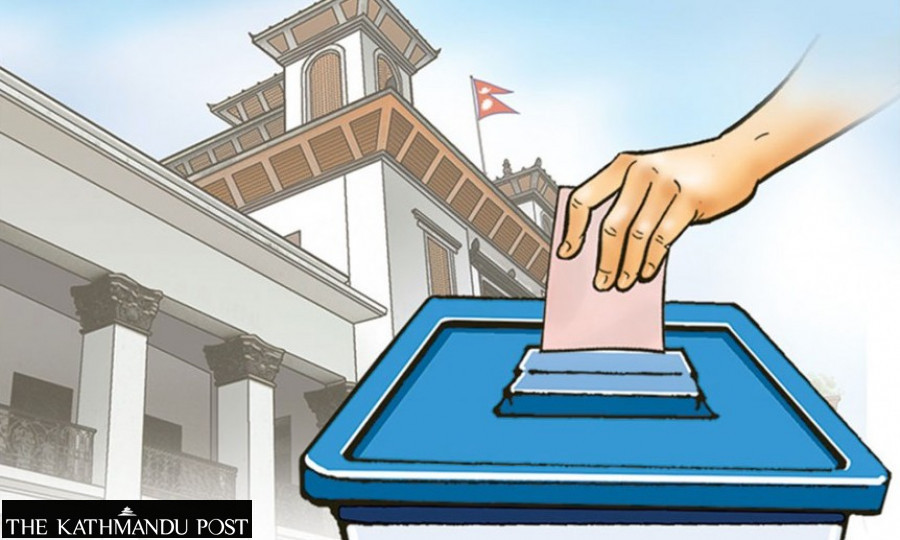National
For people with disabilities, there are barriers galore to right to voting
Secrecy, lack of ballot papers with tactile relief, and tall tables are key infrastructural issues.
Aakash Chaudhary
Phanindra Poudel of Pokhara has been hearing about the local elections but he is not keen on going to the polling booth to vote. He has bitter experiences from the past.
“As a blind person, the voting process is quite cumbersome for me,” said Poudel, chairman of Srijanshil Apangata Samaj. “I have voted in the past, but over the years, it doesn’t look like authorities have made any attempts to ease the voting process for people like us.”
Kima Rokaya, 25, from Khaptadchana Rural Municipality, Bajhang, is paralysed from the waist down.
In the 2017 elections, her family members carried her to the polling booth. This reliance on her family members to exercise her franchise led to a compromised vote from her, she says.
“The polling desk was at a height and since I couldn’t stand, my relative stamped the ballot paper and dropped it into the box without even showing me,” she told the Post. “Till date, I don’t know who I ‘voted’ for.”
Elections are a celebration in democratic countries as they are supposed to strengthen democracy, incorporating the inclusion principle. But in Nepal, people with different forms of disabilities feel neglected and excluded as the state and its agencies have failed to make the electoral process accessible to them, depriving them of their participation in the franchise, their fundamental right guaranteed by the country’s constitution and laws.
Article 42 (1) of the Constitution of Nepal says persons with disabilities shall have the right to participate in the state bodies on the basis of the principle of inclusion.
Section 11 of the Act Relating to Rights of Persons with Disabilities, 2017 says that persons with disabilities shall, on an equal basis with others, have the right to become candidates in elections in a fearless environment and to cast votes voluntarily, with or without the assistance of others. And, Article 1 of the United Nations Convention on the Rights of People with Disabilities states that persons with disabilities include those who have long-term physical, mental, intellectual or sensory impairments which in interaction with various barriers may hinder their full and effective participation in society on an equal basis with others.
According to Nepal in Data, 1.7 percent of Nepal’s total population is disabled—37,285 people are completely disabled, 49,077 severely, 66,839 are moderately disabled and 46,289 mildly.
The number of registered voters for the upcoming local elections stands at 17,733,723. Of them 8,741,530 are males, 8,992,010 are females and 183 are registered under the “other” category.
There, however, is no separate data on the number of voters with disabilities.
Shaligram Sharma Poudel, spokesperson for the Election Commission, said that the commission does not know the number of people with disabilities who have been registered as voters.
“Those with disabilities can contact the respective chief election officers and get a vehicle pass along with one person who supports them,” Poudel told the Post. “Such voters will get utmost priority during the voting and they need not stand in line.”
According to Poudel, the commission has instructed officials at the polling centres to provide help to the people with disabilities to vote.
Poudel said that it’s incumbent upon the local governments to ensure improvements in the infrastructure so that people with disabilities can participate in the voting process.
Roshan Jnawali, chief administrative officer of Mahalaxmi Municipality, Lalitpur, however, argued that the responsibility of creating disabled-friendly voting systems and ensuring inclusivity for the disabled community lies with the Election Commission or the government itself and not with the local level governments.
“Everyone working in the municipality and rural municipality are government employees and we do what the government instructs us to do,” he told the Post. “Until now we have not heard anything from the government in this regard. The municipality will take steps for the betterment of the disabled people during the election if the government instructs us to do so.”
Despite the laws being in place and the commission claiming to offer support, people with disabilities continue to face barriers to their election participation for a number of reasons.
A report titled “Access of People with Disabilities in Nepal’s Electoral Process” by Election Access, published in July 2018 after the 2017 elections, outlined some key findings.
Disabilities of different forms made it difficult for people to participate in the voting process for different reasons.
For people with visual disabilities, it was difficult to identify symbols on the ballot paper and there was a lack of tactile/braille relief. People with physical disabilities found lack of space to manoeuvre and ballot marking tables too high.
For people with auditory disabilities, a lack of sign language was a major barrier. This is exactly what Shaktiprakash Lamichhane of Pokhara experienced.
Lamichhane is mute. He said that staff assigned to assist voters like him were not trained.
“I didn’t know how to cast my vote and no one was willing to teach me when I went to vote in 2017,” Lamichhane conveyed his experience to the Post through a sign language interpreter. “I felt humiliated at the voting booth because no one knew how to communicate with me, let alone teach me how to cast my vote.”
The Election Commission this time did not run voter education campaigns for a host of reasons including a lack of budget. In such a situation, voter education exclusively for people with disabilities was out of the question. With alliance politics and complicated ballot papers, there are already concerns about the high number of invalid votes this time.
According to Kamala Japarel, a blind woman from Durgathali Rural Municipality, Bajhang, voters with disabilities have to travel for two hours on foot to reach the nearest polling station.
“We have to travel on rough roads. So I have to take someone with me when I go to vote but I don’t like asking for favours. I may not go to cast my vote this year,” she said. “I’m not even sure if the person helping me vote will be honest with me.”
In Bajhang, there are more than 4,500 people with disabilities and more than 3,000 are registered voters, according to Bajhang Disability Security Network.
According to Brahmadatta Joshi, chairman of the network, more than 800 registered disabled voters were deprived of voting freely due to various reasons in the 2017 elections.
“In the remote areas, most of the polling stations are at places that are not convenient for the people with disabilities,” said Joshi. “People with serious disabilities cannot reach there and even when they do with some help from acquaintances and family members, chances of their vote going to the candidate of their choice are minimal.”
He stresses the need for policy-level intervention so as to realise the state’s commitment to ensuring the participation of the people with disabilities in the electoral process.
According to Samriddhi Rana, a disability and rehabilitation specialist who has been working with the disabled community for about 10 years, while there has been some effort to make voting inclusive, many people with disabilities still face challenges to fully and freely exercise their voting rights.
“Polling booths are not disabled-friendly. Many cannot read the ballot papers,” she said. “If voting is to be made more inclusive for people with disabilities, gaps must be bridged.” According to her, one strategy to enable increased participation is to create better access and that could be through electronic voting methods.
Gajendra S Budhathoki is a journalist and a wheelchair user who has for long been advocating for inclusivity and ensuring access to public places for people with disabilities.
He says the Election Commission has failed to make any improvements from the last elections to make the electoral process inclusive.
“It seems officials at the Election Commission haven't read the constitution which guarantees disabled people’s right to vote,” Budhathoki told the Post. “This time too they have failed to make polling stations disabled-friendly. Disabled people like us should refrain from voting until the government and the commission make efforts to ensure inclusivity.”
Basanta Pratap Singh from Bajhang and Deepak Pariyar from Pokhara contributed reporting.




 18.12°C Kathmandu
18.12°C Kathmandu















